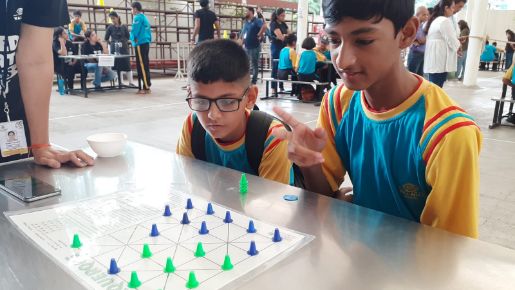Don’t we want our students to not be afraid to try out something new? Don’t we want them to be comfortable to fail and learn from their mistakes and get even better?
We all know that it is important to teach our children to think fast, take calculated risks, not be rattled by a dynamic environment – but they are still kids! How do we do all this in a safe space?
Well, everyone talks about this – but no one really does anything about it. At Walnut School, we walk the talk.
We do it in the Strategic Thinking period. This is a class that students have once a week from Std 1 to 10. They try out challenges, solve puzzles and play board games. This is a room where the environment is very dynamic. Puzzles need them to think in many different ways, and quickly – to be able to solve it. Challenges make them think fast and out of the box. There is no defined content that they can refer to. Board games have a constantly changing scenario.
We absolutely love to have the kids play strategy games against each other – be it board games or card games.
Here is why :
- Develops quick thinking, Risk taking : stakes are low. It doesn’t matter if they lose, but they see the consequences of their actions. This helps them practice quick assessment of the situation and analysis.

- Helps with brain development : It improves memory and cognitive skills, increases processing speed, concentration, focus, develops logic and reasoning, improves critical thinking, boosts spatial reasoning, increases attention and concentration and teaches problem-solving.
- Develops personality traits : Sportsmanship, interpersonal skills, confidence and understanding, being part of a team, verbal and communication skills.
- They help develop social skills. Good communication, negotiating and compromise is needed in board games. These skills help in many areas of life – academics, work, relationships.
- Mental health benefits : Laughing, reducing stress, relaxation, making memories, reducing isolation!
Students have to figure out how to make a comeback, do damage recovery etc. They get to negotiate, compromise and manage restrictions. They get a chance to guess from body language, facial clues and tone. They get a chance to do all this in a safe environment. As you can see, this activity really helps in building resilience and improved decision making. That is one more step towards being tough and smart!
With all these benefits, how can you even imagine a school without board games?
At Walnut, we have carefully selected board games from all over the world. We have modified them keeping in mind the age of the children and the skills that they already have.
We also have to make sure that the students finish a round in about 10 minutes so that they can play 2 more rounds and apply their learning and new strategies in the subsequent games. They can also switch partners so that they get to face different gaming styles.
The whole classroom becomes a gaming zone. It’s so much fun to watch that you can only imagine how amazing it must be to be a student in such a program. The students are getting smarter, making memories and creating good, strong neural pathways in their brain to use in the future.
Here is a quick peek at some of the games that the kids play if you want to try them out.
Std. 1 : Classify it
Std. 2 : Kidoku
Std. 3 : Fish Out
Std. 4 : Len Choa
Std. 5 : Watermelon Chess
Std. 6 : Salamanders vs. Frogs
Std. 7 : Array Capture
Std. 8 : Alquerque
Std. 9 : 6 Men Morris Board
Std. 10 : 6 Men Morris Board
Our students from Std. 3 to 10 also have a Board Game Competition on Electric Saturdays, which are super fun!
But don’t take our word for it – industry leaders like Reid Hoffman (founder of LinkedIn) have spoken about this too. Hear him talk about it in his podcast – Masters of Scale.
